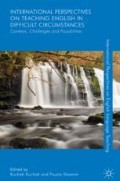Abstract
The concluding chapter highlights the major themes and lessons learnt from the contributions to this volume, representing the myriad worlds in which English is taught across three continents, that is, Asia, Africa and Latin America. The differences in terms of resource provision, affordability or teaching-learning environment, such as large under-resourced classrooms and ELT in a prison or refugee camp, require the ELT profession to be responsive to the varied contexts of its ‘agents’ and ‘clients’ (teachers and learners) and explore a variety of approaches including technology-based solutions, classroom research and the use of skilled local teachers’ knowledge and expertise to address local exigencies within the global trends in ELT.
The original version of this chapter was revised. The affiliation of the author has been updated. An erratum to this chapter can be found at https://doi.org/10.1057/978-1-137-53104-9_13
Access this chapter
Tax calculation will be finalised at checkout
Purchases are for personal use only
References
Borg, S., & Sanchez, H. S. (Eds.). (2015). International perspectives on teacher research. Basingstoke: Palgrave Macmillan.
Buckingham, J. (2003). Class size and teacher quality. Educational Research for Policy and Practice, 2(1), 71–86.
Darling-Hammond, L. (2000). Teacher quality and student achievement: A review of state policy evidence. Education Policy Analysis Archives, 8(1), 1–44.
Dearden, J. (2015). English as a medium of instruction- a growing global phenomena: Final report, January 2015. Oxford University, Department of Education and British Council. Available online at: http://www.britishcouncil.org/education/ihe/knowledge-centre/english-language-higher-education/report-english-medium-instruction. Accessed 3 Apr 2016.
DuFour, R. (2004). What is a professional learning community? Educational Leadership, 61(8), 6–11.
English in Action. (2016, March 16). Exploring interdependence between modelling practice, school-based development and teacher networks. Highlights of technical forum, Mirpur, Bangladesh. Available at: https://www.eiabd.com/publications/proceedings.html. Accessed 20 Aug 2016.
Hamid, M. O., & Honan, E. (2012). Communicative English in the primary classroom: Implications for English-in-education policy and practice in Bangladesh. Language, Culture and Curriculum, 25(2), 139–156.
Hattie, J. (2003). Teachers make a difference: What is the research evidence? Paper presented at the Australian Council for Educational Research Annual Conference on Building Teacher Quality, Melbourne. Available at: http://www.educationalleaders.govt.nz/Pedagogy-and-assessment/Building-effective-learning-environments/Teachers-Make-a-Difference-What-is-the-Research-Evidence. Accessed 17 Feb 2016.
Holliday, A. R. (1992). Tissue rejection and informal orders in ELT projects: Collecting the right information. Applied Linguistics, 13(4), 402–424.
Holliday, A. R. (1994). Appropriate methodology and social context. Cambridge: Cambridge University Press.
Hu, G., Li, L., & Lei, J. (2014). English-medium instruction at a Chinese university: Rhetoric and reality. Language Policy, 13, 21–40.
Kirkpatrick, R., & Bui, T. T. N. (2016). Introduction: The challenges for English education policies in Asia. In R. Kirkpatrick (Ed.), English language education policy in Asia (pp. 1–23). Cham: Springer International publishing.
Knight, J. (2009). What can we do about teacher resistance? Phi Delta Kappan Magazine, 90(7), 508–513.
Michaelowa, K. (2001). Primary education quality in francophone Sub-Saharan Africa: Determinants of learning achievement and efficiency considerations. World Development, 29(10), 1699–1716.
Power, T., Shaheen, R., Solly, M., Woodward, C., & Burton, S. (2012). English in action: School based teacher development in Bangladesh. Curriculum Journal, 23(4), 503–529.
Samb, M. (2013). Formative assessment for a pedagogy of success. In J. Edge & S. Mann (Eds.), Innovations in pre-service education and training for English language teachers (pp. 33–46). London: British Council.
Schieb, L. J., & Karabenick, S. A. (2011). Teacher motivation and professional development: A guide to resources. Math and science partnership—Motivation assessment program. Ann Arbor: University of Michigan.
Shamim, F. (2013). Towards an understanding of teachers’ resistance to innovation. In A. Ahmed, M. Hanzala, F. Saleem, & G. Cane (Eds.), ELT in a changing world: Innovative approaches to new challenges (pp. 87–103). Newcastle upon Tyne: Cambridge Scholars Publishing.
Shohamy, E. (2013). A critical perspective on the use of English as medium of instruction at universities. In A. Doiz, D. Lasagabaster, & J. M. Sierra (Eds.), English as medium of instruction at universities: Global challenges (pp. 196–210). Bristol: Multilingual Matters.
Smith, R. C. (n.d.). Teacher education for teacher-learner autonomy. Available online: http://homepages.warwick.ac.uk/~elsdr/Teacher_autonomy.pdf. Accessed 17 Feb 2016.
Smith, R., & Kuchah, K. (2016). Researching teacher associations. ELT Journal, 70(2), 212–221.
Smith, R., Rebolledo, P., Shamim, F., & Wyatt, M. (2015). Teacher development around the world. In T. Pattison (Ed.), IATEFL 2014 Harrogate conference selections (pp. 197–201). Kent: IATEFL.
UNESCO. (2007). Global perspectives on teacher learning: Improving policy and practice. Paris: UNESCO, International Institute for Educational Planning.
UNESCO, UIS & Global Monitoring Review. (2014, October). Wanted: Trained teachers to ensure every child’s right to primary (Policy paper 15). Fact sheet 30 30 Available at: http://unesdoc.unesco.org/images/0022/002299/229913E.pdf Accessed 12 Feb 2016.
Ushioda, E. (Ed.). (2013). International perspectives on motivation. Basingstoke: Palgrave Macmillan.
Verspoor, A. M. (Ed.) (2005). The challenge of learning: Improving the quality of basic education in sub-Saharan Africa; document presented at the 2003 ADEA Biennial Meeting, Grand Baie, Mauritius, December 3–6, 2003. Association for the Development of Education in Africa. Available at: http://www.adeanet.org/adea/biennial2003/Biennale%202003/challenge%20sumary.pdf. Accessed 3 Jan 2017.
Westbrook, J., et al. (2013). Pedagogy, curriculum, teaching practices and teacher education in developing countries (Education rigorous literature review). London: UK Department for International Development. Available at: https://www.gov.uk/government/uploads/system/uploads/attachment_data/file/305154/Pedagogy-curriculum-teaching-practices-education.pdf. Accessed 3 Jan 2017.
Author information
Authors and Affiliations
Editor information
Editors and Affiliations
Copyright information
© 2018 The Author(s)
About this chapter
Cite this chapter
Shamim, F. (2018). Conclusion: Teaching English in Difficult Circumstances—Lessons Learnt and the Way Forward. In: Kuchah, K., Shamim, F. (eds) International Perspectives on Teaching English in Difficult Circumstances. International Perspectives on English Language Teaching. Palgrave Macmillan, London. https://doi.org/10.1057/978-1-137-53104-9_12
Download citation
DOI: https://doi.org/10.1057/978-1-137-53104-9_12
Published:
Publisher Name: Palgrave Macmillan, London
Print ISBN: 978-1-137-53103-2
Online ISBN: 978-1-137-53104-9
eBook Packages: Social SciencesSocial Sciences (R0)

